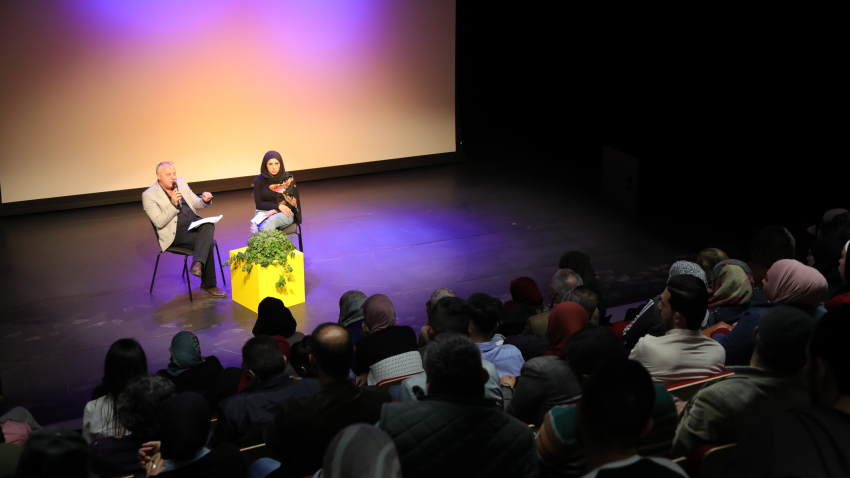
Ramallah – A.M. Qattan Foundation
The Educational Research and Development Programme at the A.M.Qattan Foundation screened, on Saturday 30/11/2019, a movie entitled “The Crossing Point,” which is considered one of the outcomes of the Culture, Arts, and Community Participation Project implemented in partnership with the Swiss Agency for Development and Cooperation (SDC).
The movie explores the effects that the Ni’lin checkpoint has had on its residents, the nature of life there, and the viewpoints of the people of Ni’lin. This checkpoint is a transportation area for people who work in the occupied side, and which created job opportunities by setting kiosks and parking lots for the cars owned by the workers etc. The movie also dealt with some of the incidents or events that occur during demonstrations in the wall area of the village, and shows settlers in Al-Muhallal area which is considered a trade and industrial zone.
The researcher, Yasmin Qaadan, presented an intervention on the artistic and social implications of the movie, as illuminations on the various manifestations that the movie presents with the abundance of contradictions within the colonial reality. She took Ni’lin, its checkpoint, and the natural landscape there as a small unit, leading to an understanding of the colonial policies on Greater Palestine.
Qaadan reports, “The movie represented consecutive chapters of crossing in the meanings of disguise; disguising the other(s) in the narratives of the participants, on the meanings of Ni’lin, the other who refuses and resists, and the obedient [submissive] in favor of his living, and the other who fights for his childhood, and is aware of the value of wind in resistance, and the other hidden [disguised] colonial who is present in the formation of all the above, while the camera crosses between all the contradictions of the story, music, and the natural landscape that is changing with its cactus.”
Rimawi added, “At the same time and during the search, it was found out that the checkpoint created an entry point for stimulating debate in the village, and formed a point of social difference. Thus, difference is the most appropriate point to understand society and its vision, so the movie was an introduction / intervention to the vision, and to the difference that leads to the vision. Since the movie is part of a project, we bet it will be a crossing point to a state of practical dialogue (debate) as to how we can relocate ourselves and act in life as effective doers; to our personal lives, where we want to seek a job, provide bread on the table, and teach our children, but also prioritize the issues of home and identity.”
That intervention was followed by a discussion about what was presented. Some of the audience rejected the image that the movie presented about their village despite the fact that the movie came out as a result of excessive research, and after addressing the demands of the project students and those involved in it from the village itself. Some of the audience praised the importance of the stories covered and told in the movie, noting that it [the movie] is short; since its duration is not sufficient to show/present all the stories.”
Journalist Ahmad Yousef from Ultra Palestine said, “The movie dealt with several stories that led to some distraction because its duration is insufficient. It also drew my attention that some of the characters were not able to speak about a certain topic; for example, “Hamdan” is not the right person to talk about the methods of inspection and suffering that workers are exposed to while entering through the checkpoint, so it may be more appropriate if one of the workers talked about this issue instead of Hamdan.”
Whereas, the young man Mohammed Sorour, said, “The movie’s characters should be appreciated for their boldness to talk about an issue that may expose them to harm later, and we should remember and be aware that Ni’lin is the aim here. All we have to do is protect our village from the risks and all negative impacts it may be exposed to.”
He added, “Whoever wants to speak out and object to the image presented by the movie, has to come back to reality and does an effective and serious deed to protect the land, not to speak while living away from it.”
It should be noted that the movie is directed by Bassam Jarbawi in 2017 as part of the Culture, Arts, and Community Participation Project implemented by the Research and Educational Development in partnership with the Swiss Agency for Development and Cooperation in six locations: Ni’lin, Qalqilya, Jericho, Anabta, Qatanna, and Khan Yunis.
